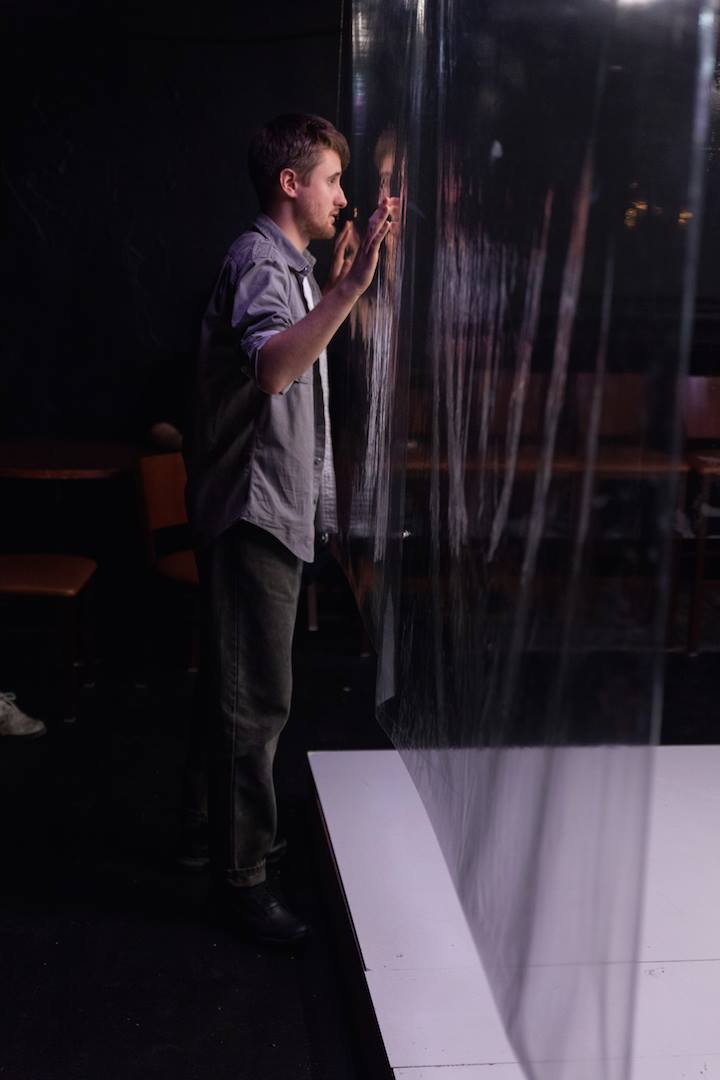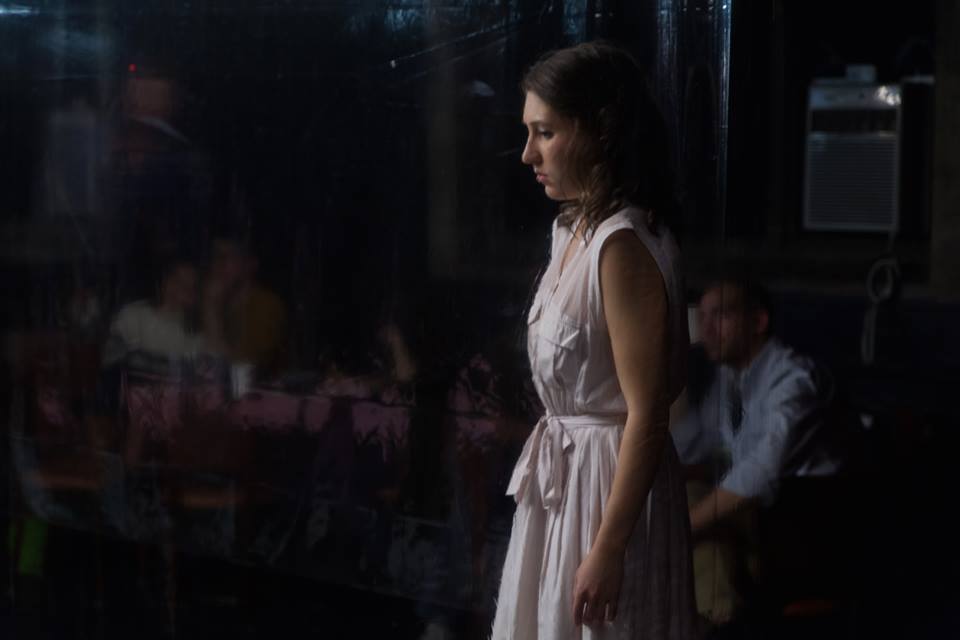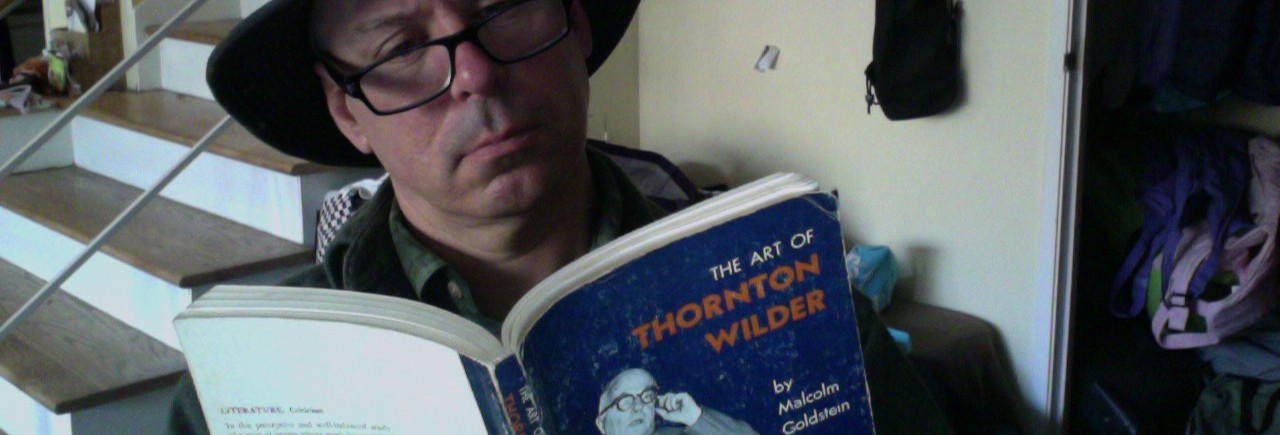
Roberto Zucco
By Bernard-Marie Koltès. Directed by Christopher Ghaffari. Composer: Sam Suggs. Dramaturg: Ariel Silbert. Scenic Designer: Alexander Woodward. Costume Designer: Asa Benally. Lighting Designer: Andrew Griffin. Sound Designer: Ian Williams. Projections Designer: Rasean Davonte Johnson. Associate Sound Designer: Matthew Fischer. Technical Director: William Hartley. Stage Manager: Emely Zepeda. Producers: Tanmay Manohar and Gretchen Wright. Cast: Aubie Merrylees (Roberto Zucco), Brontë England-Nelson (Mother, Lady, Prostitute, Old Gentleman), Dylan Frederick (Second Officer, Madam, Super, Woman 2), Alyssa Miller (Girl), Jacob Osborne (Brother, Child), Paul Cooper (First Officer, Father, Bruiser, Man 1, Pimp), Juliana Canfield (Sister, Sergeant, Prostitute, Man 2).
Through Nov. 14 at the Yale Cabaret, 217 Park St., New Haven. (203) 432-1566, http://yalecabaret.org. Remaining performances are Saturday at 8 & 11 p.m.
Plays about serial killers can be funny things. In the hands of such a deft, damaged, willfully provocative playwright such as Bernard-Marie Koltès (who died in 1989 before he could see his final play Roberto Zucco produced), murder is a meditative and metaphorical yet also mirthful act.
Laughter flowed steadily from some observers of the 11 p.m. performance of Roberto Zucco last night at Yale Cabaret. Some was the nervous kind, some the ironic kind, but there were definitely some real honest found-that-funny laughs. The show, about a wayward serial killer and prison escapee, has its horrific encounters and existentialist intellectual debates, but there were moments in the first quarter of the show where I honestly believed that Koltès was purposefully channeling Punch & Judy, the comic British seaside puppetry classic where a wretched clown throws a baby out a window, kills his wife and anyone else who comes near him and ends the mayhem with chaotic laughter.
The title character of Robert Zucco is not, however, Mr. Punch but rather closely based on a real-life Italian killer named Roberto Succo (I did say “rather closely”), whose escape and subsequent crime spree was still happening the same year that Koltés wrote his play. Succo had earned a degree in Political Science while in prison. This must have been a particularly inspiring characteristic to the playwright, whose plays openly question the motivations for cruelty, capitalistic greed, power abuse and immorality.
New Haven theatergoers will recall that Robert Woodruff directed a production of Koltès’ Battle of Black and Dogs at the Yale Rep in 2010, working from a fresh translation by Michaël Attias (who also composed and performed the show’s live musical score). Christopher Ghaffari’s production of Roberto Zucco is very much in synch with that Woodruff wonderment, despite being much lower-tech. There’s that same stark, shiny, well-constructed disorientation in the set design; for Roberto Zucco, Alexander Woodward has wrought a central white rectangular platform surrounded with clear plastic curtains. Lighting designer Andrew Griffin deliberately leaves the actors in the dark for key moments.
There’s a similar distancing, a similar exaggerated quality to the acting. This is essentially a cops-and-robbers drama, with such stock roles as aggrieved parents, damsels in distress, outspoken victims, doggedly pissed-off police officers and vulnerable children. The performances are more caricature than stereotype. Brontë England-Nelson amuses with a series of comic voices (“Mother,” “Lady,” “Prostitute,” “Old Gentleman”) yet she fully acts these roles, giving the characters strengths and weaknesses that counter the threats and struts of Zucco. With seven actors portraying over 20 characters, the stage seems more crowded than it actually is. A full cross-section of society is achieved, with appropriate madness and menace.
As the title character, Aubie Merrylees smolders like nobody’s business. The role is not a far cry from the bloodsoaked son Merrylees played last month in Luke Harlan’s production of The Skin of Our Teeth at the Yale School of Drama, yet neither role is one that you might generally expect to see an actor of this physique and vocal tone. I’ve seen Merrylees play goofy, weak, sad and worry that he’ll have a career of being typecast as sad-sack substitute teachers. Here, he’s brooding and moody and violent and mysterious. It’s a pleasure to see what he does with such a merciless, mercurial character. A more traditional leading-man type actor would be predictable in the part. Merrylees is anything but, twisting with acrobatic intensity, staring down the audience and ravaging his castmates. The most complex of his victims, a woman known only as “girl” or “little miss,” is compellingly portrayed by Alyssa Miller with an ideal blend of innocence and audacity.

Given the current climate of sensitivity to race and class differences on the Yale campus, a foulmouthed, insult-streaming, assault-minded play like Roberto Zucco can be a challenge. Yes, some laughed powerfully at last night’s late show, but others sat stony-faced or incredulous. The script had its work cut out for it. It isn’t enough to offend and amuse; enlightenment is required. Koltès does indeed make some important points about inhumanity, profoundly and articulately. The Cabaret cast gives his words the appropriate snarls and smirks and wired movements it snakily demands, but also a necessary severity and cut-throat seriousness. A killer show indeed.
